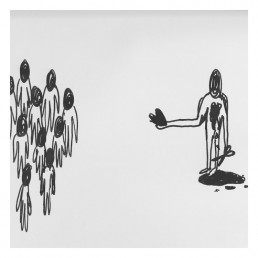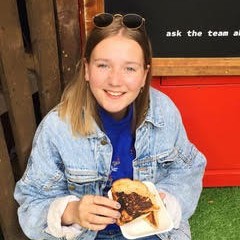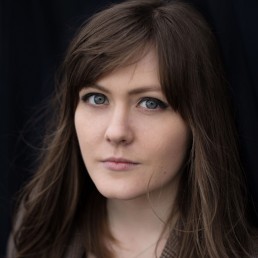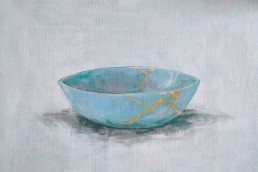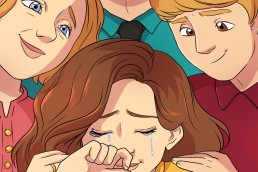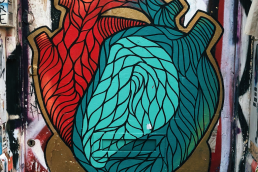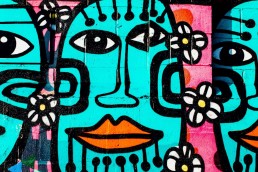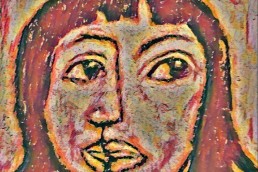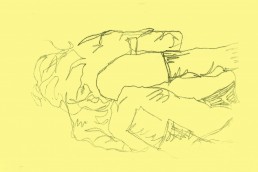Words by Emma Penney | Art by Annie Rew Shaw
A year ago, the thought of openly discussing my mental health with strangers was potentially the most terrifying thing that could happen. I couldn’t even talk to my closest friends about it, let alone people I didn’t know. The surprising thing is that in the end it was connecting with strangers that set me off on a mission to talk about depression, and allowed me to open up to my loved ones.
I have suffered from anxiety and depression since I was about 14. I found adolescence an extremely difficult time; everyday finding new ways to hate myself. Arriving at university pretty terrified, this rock bottom self-esteem continued to affect my capacity to form new relationships and left me fairly isolated. Entering the second semester of my first year, I felt fairly hopeless about the future, essentially accepting that I would feel like this forever. However, one slightly better evening — on a whim — I sent off an application for a small role on the RAG committee (Raising and Giving). To my absolute shock, I was offered it, and joined a group of the most glorious people. It became my lifeline and I ended up as President when I came back in my second year. It got me out of the house everyday, and forced me to socialise in a way I never would have been able to without it. Dedicating myself to helping other people initially was a tool to just ignore how much I disliked myself, but slowly it started to let me value myself. Recognising that the things I was doing were making the world a better place for someone else helped me see that the world was ultimately better with me in it.
Helping my community also changed me in other ways. Seeing the way other people relied on me allowed me to know that it was ok to rely on others too. This year, I told the first person about how awful I felt. It was life changing. After telling them, the floodgates opened. In true Generation X style, I wrote a piece on my mental health and shared it on Facebook. The response I received was incredible — friends I hadn’t spoken to in years reached out, because they finally understood why I isolated myself. I felt closer to the friends I’d made, because they actually knew the whole of me. I could talk to people about my problems without feeling a profound sense of guilt, or that I was making it all about me. Don’t get me wrong, I am still the queen of overthinking, and when I am in my darkest place I still can’t reach out to anyone, but I can now explain why I disappeared off without sounding like I have the weakest immune system known to man (or woman).
By helping my community, it helped me back. I feel so incredibly lucky to have such kind and understanding friends and family, but also I now know that it’s ok to have a stranger feel empathy for you. It’s not pity and it doesn’t make you some kind of inferior being — mutual compassion is a good thing, it works both ways to care for someone. I no longer feel I simply have to give; it’s normal to take a bit too.
I would say the pinnacle of community affecting me was my trip to Palestine in the summer. I study Arabic and somehow landed an opportunity to go and run a summer camp for children who can’t stay with their families for various reasons. It was the most eye-opening experience and was truly a difficult trip. However, the kindness I was shown by people who have lost so much taught me the true meaning of community. When you feel strong, you help those who feel weaker; and when you feel weak, they will help you back.
In essence, community has changed me in so many ways. The wider community helped me see my own personal community that had been trying to be there for me for so long, and have persevered, even when I tried to push them away. It helped me see what normal relationships are — and that there is a difference between selfishness and just asking for help. The biggest lesson I’ve learned though, is that I can make other people’s lives better by being me. If I dropped off the face of the earth, I would be missed, and I can change the world if I try hard enough; depression or not. Community is my reason to stay alive, and I will be forever grateful to the people who helped me see that.
Emma Penney
Emma is a student of Arabic and French at the University of Edinburgh, currently living in Amman. She is passionate about gender equality and promoting the conversation around mental health. She created her podcast Hopeful in an effort to shine a light on positive news stories and people making the world a better place. At the end of a long day she likes nothing more than sitting with a glass of red wine and some Co-op salt and vinegar crisps.
Annie Rew Shaw
Annie is a musician, artist and writer from Devon, now based in North London. She performs and releases music under the moniker Austel.
Her poetry, illustrations and music serve as a cathartic outlet; depicting the vivid physical and verbal imagery that we can use to articulate mental health and human emotion.

